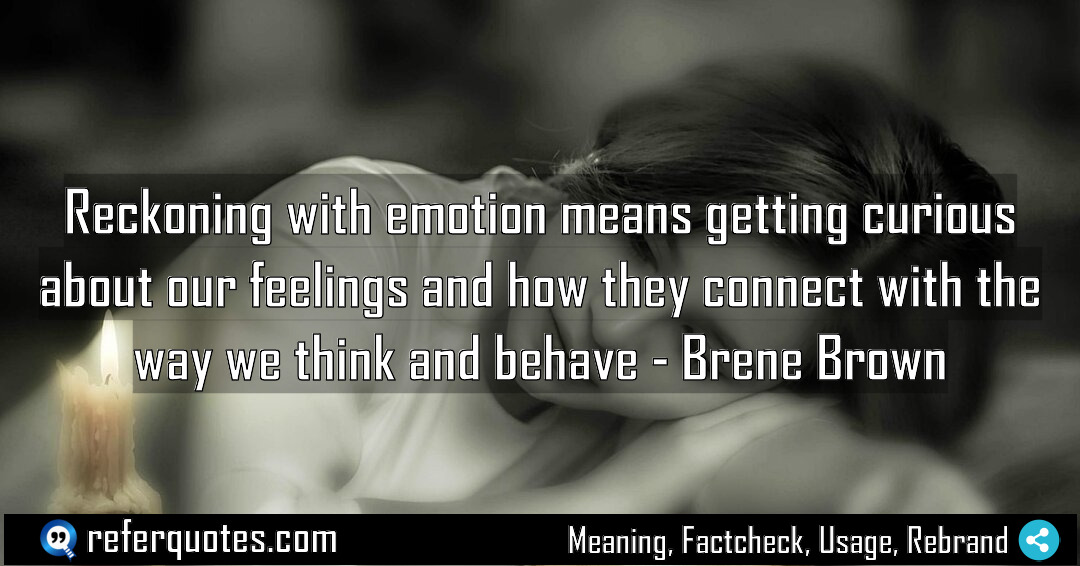
You know, “Reckoning with emotion means getting curious” is one of those concepts that completely changed how I approach tough days. It’s not about suppressing what you feel, but about turning towards it with genuine interest to understand the story you’re telling yourself.
Share Image Quote:
Table of Contents
Meaning
At its core, this quote is about stopping the autopilot reaction to our emotions and instead engaging with them as valuable data.
Explanation
Look, for the longest time, I thought being “professional” or “strong” meant powering through feelings. But what Brene is saying here is that’s a trap. Reckoning isn’t wallowing. It’s the exact opposite. It’s the moment you pause and ask, “Okay, why is this frustration hitting me so hard right now?” You get curious. You trace the thread from the feeling (“I’m so angry”) to the thought driving it (“My idea was dismissed”) to the behavior it triggers (“I’m going to shut down and not contribute”). That loop, when you see it clearly, is where your real power is. It’s the difference between being hijacked by an emotion and actually using it.
Quote Summary
Reading Level40
Aesthetic Score82
Origin & Factcheck
This wisdom comes straight from Brené Brown’s 2015 book, Rising Strong, which was published in the United States. You sometimes see her quotes floating around unattributed, but this is 100% from her research on vulnerability and resilience.
Attribution Summary
Author Bio
Dr Brene Brown is the author of books such as Daring Greatly and The Power of Vulnerability. The TED talk and Netflix production based on her research reached out to millions of audience. She researches effects of courage and vulnerability in shaping people's work and relationships. She leads the Brené Brown Education and Research Group and provides evidence-based insights into practical tools to help people train themselves
Official Website |Facebook | X | Instagram | YouTube |
Where is this quotation located?
| Quotation | Reckoning with emotion means getting curious about our feelings and how they connect with the way we think and behave |
| Book Details | Publication Year/Date: 2015; ISBN/Unique Identifier: 9780812995824; Last edition. Number of pages: 336. |
| Where is it? | Approximate page, The Reckoning section |
Context
In the book, this is part of the “Rumble” stage of her “Rising Strong” process—that messy, uncomfortable phase after a fall where you wrestle with the truth of what happened. She frames this curiosity as the essential first step to writing a new, braver ending to your story.
Usage Examples
So how does this work in real life? Let’s say a project at work goes sideways.
- For a Team Leader: Instead of just feeling collective panic, you get curious. “What’s the fear underneath this panic? Ah, we’re scared of looking incompetent. Okay, so let’s address that fear head-on in our next meeting instead of just assigning frantic tasks.”
- In a Personal Relationship: You feel a sharp sting of jealousy. Instead of letting it turn into a snarky comment, you get curious with yourself. “What’s the story I’m telling myself that’s making me feel insecure here?” That pause changes everything.
- For Anyone, Really: It’s the ultimate tool for self-awareness. It turns emotional chaos into actionable insight.
To whom it appeals?
Share This Quote Image & Motivate
Motivation Score80
Popularity Score90
Shareability Score88
Common Questions
Question: Isn’t getting curious about negative emotions just overthinking?
Answer: Great question, and it’s a crucial distinction. Overthinking is often circular and passive—you’re just re-living the pain. Curiosity is active and forward-moving. It’s a structured inquiry: “What is this feeling? What thought sparked it? What do I truly need?” It’s solution-seeking, not rumination.
Question: How is this different from just venting?
Answer: Venting is like releasing steam. It might feel good in the moment, but it doesn’t fix the boiler. Reckoning is when you actually open up the boiler to see why it’s overheating in the first place. One is an outlet, the other is a diagnosis.
Question: Can this really work in a high-pressure business environment?
Answer: It’s especially powerful there. Think about it. A reactive leader is a liability. A leader who can pause, get curious about the team’s anxiety or a client’s frustration, and respond from a place of understanding? That’s a massive strategic advantage. It transforms conflict into connection and problems into puzzles to be solved.
Similar Quotes
Your emotions are not about what happens… it’s a game-changer, honestly. This insight from Daniel Kahneman flips the entire script on how we experience life. It means the power over…
Emotions are what make us human… but Kiyosaki argues they’re not just feelings, they’re a powerful form of energy that we can learn to direct, rather than letting them control…
Learn to use your emotions to think… it’s a game-changer. This isn’t about suppressing feelings; it’s about harnessing them as data. You acknowledge the fear, the greed, the excitement, and…
Empathy is feeling with people; sympathy looks at them. This is one of those quotes that completely reframes how we connect with others. It’s not just semantics—it’s a fundamental shift…
When you are asked what you think about something, your answer is often based on what you feel. It’s a simple truth that reveals how our minds really work, and…
